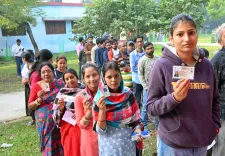Did Delhi Police Uncover a Massive Telegram Scam That Duped a Woman of Rs 11 Lakh?

Synopsis
Key Takeaways
- Cyber fraud is on the rise, and individuals must be vigilant.
- The importance of verifying online opportunities cannot be overstated.
- Law enforcement agencies are actively working to combat such scams.
- Awareness and education are key in preventing cyber crimes.
- Report any suspicious activities immediately to authorities.
New Delhi, July 12 (NationPress) The Cyber Police Station of North District has successfully dismantled an inter-state cyber fraud gang that deceived a woman from Delhi out of Rs 11 lakh by enticing her with fraudulent online “paid tasks” advertised on Telegram.
The operation resulted in the apprehension of five suspects from Meerut and Muzaffarnagar in Uttar Pradesh.
The victim, hailing from Shastri Nagar, stumbled upon a Telegram link that promised high returns for completing simple online assignments. She transferred a total of Rs 11 lakh through several transactions before realizing the deception and subsequently filed a complaint via the NCRP portal. A case was registered, prompting an investigation.
A police team, led by Inspector Manish Kumar and overseen by ACP Hemant Kumar Mishra, conducted an extensive technical analysis involving over 100 mobile numbers and various bank transactions.
Through persistent tracking and raids in Meerut and Muzaffarnagar, officers arrested Kartik Saini and Varun Kumar on June 25, followed by Sharim Khan on July 7, and Humaid Khan and Suhail Saifi on July 9.
During questioning, the suspects disclosed a complex scam involving two distinct chains. Kartik and Varun established bank accounts and shared the access details with a person named Yash, who funneled the illicit funds and disbursed commissions.
Simultaneously, Sharim, Humaid, and Suhail were engaged in similar operations within a parallel chain.
Humaid claimed he was merely following the directives of a friend, Sameer Malik, who is currently pursuing an MBBS degree in Russia.
“The authorities recovered five mobile phones, five SIM cards, three cheque books, and two ATM cards from the suspects. Data analysis from these devices indicated that Humaid Khan and Varun Kumar are primary conspirators supplying bank accounts to the fraudsters,” stated DCP Raja Banthia.
The police suspect that a broader network may be involved, with numerous similar incidents connected to the same bank accounts. Further investigation is ongoing.









